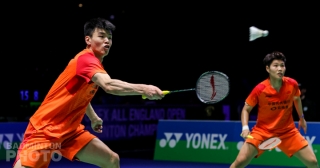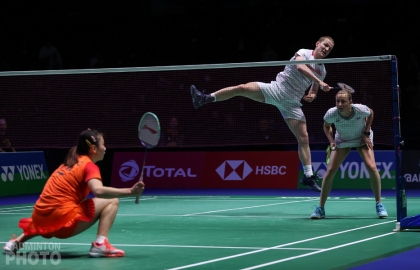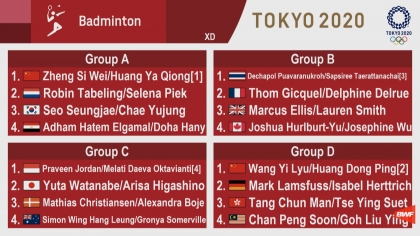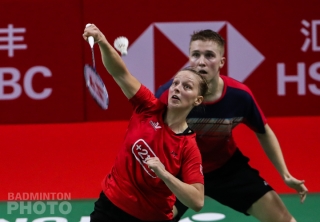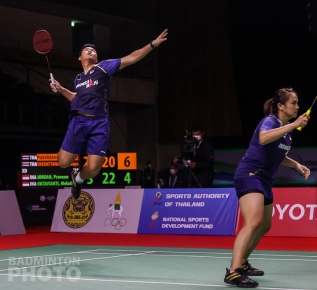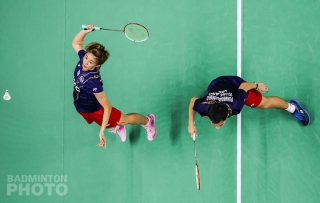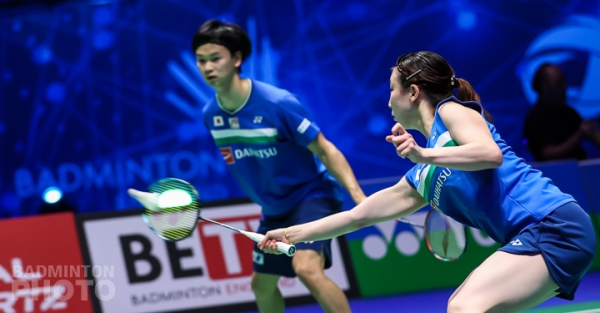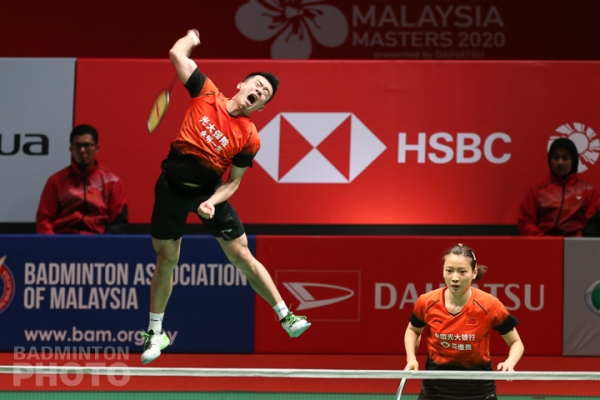
Zheng Siwei and Huang Yaqiong reigned supreme over mixed doubles for more than two years but can they come back and add Tokyo Olympic gold to their title trove?
By Don Hearn. Photos: Badmintonphoto
Mixed doubles is finally going to see its world #1 back on court after a long pandemic-induced hiatus. Mixed is not alone in this, of course, but Gideon/Sukamuljo at least entered some tournament in the past year and they even played a match before the Indonesian team was forced out of the All England earlier this year. And it’s been almost the same story for Kento Momota in men’s singles.
Zheng Siwei and Huang Yaqiong (pictured top) are the only world #1 whose pre-pandemic dominance of their event can compete with the men’s singles and doubles stars. They may have let the 2020 All England elude their grasp but they had won the first two Super 500 events in 2020 after a 2019 when they won their second World Championship, as well as the World Tour Finals and all three Super 1000 titles.
Since last year’s hurrah in Birmingham, though, the Chinese aces have been out of sight, out of mind – both Zheng/Huang and their world #3 compatriots Wang Yilyu / Huang Dongping (pictured above). The Olympic mixed doubles gold has only been won by a top-seeded pair once, in 2012, but had the Games gone on as planned in the summer of 2020, all would have been expecting that number to duly double.
But given that all of the top pairs in the world have had to prepare largely in silo conditions, like never before, for these Olympics, if they have at least been able to spar with their own national team, it is hard to imagine anyone who could keep Zheng/Huang as sharp as their team-mates, and vice-versa for that matter.
Picking up where they left off
Interestingly, Zheng Siwei and Huang Yaqiong will start in Tokyo where their path ended last March. There is only one pair at these Olympics that the Chinese have never beaten and that’s who was drawn in their group. Selena Piek and Robin Tabeling (pictured above) of the Netherlands ousted Zheng/Huang from their last All England and they will be hoping to repeat that feat. Also in the group are Korea’s Seo Seung Jae / Chae Yoo Jung, the highest ranked pair that has never once beaten the top-seeded Chinese duo.
Still according to plan?
Hitherto, mixed doubles has been by far the most predictable at the Olympic group stages. In both 2012 and 2016 – the only two editions that began with a round robin stage – the expected quarter-finalists emerged, with just a single European exception in each case. Fuchs/Michels and Mateusiak/Zieba respectively beat out two higher-ranked European pairs to advance to the final 8 but both failed to advance to the semis.
There is not quite the concentration of European talent in this year’s Games to produce an identical result but two groups will certainly be interesting to watch. The closest will likely be Group D. Wang/Huang are undefeated against so many pairs in this tournament and yet two pairs they’ve had trouble with in the past are drawn together in the same quartet, all vying for two available spots in the quarters.
Germany’s Mark Lamsfuss / Isabel Herttrich have yet to beat any of the three pairs but after their Denmark Open win last year, they have more confidence now than they had the last time they encountered any of those opponents.
Group B will be made interesting by the recent form of France’s Thom Gicquel / Delphine Delrue (pictured above). The Europeans beat world #2 Dechapol Puavaranukroh / Sapsiree Taerattanachai early last year and they have a completely different bearing from what they brought to their last encounter with Britain’s Ellis/Smith, at the 2019 European Games.
The business end
Regardless of the hiccups at the group stage, the knockout round is likely to feature all of the top contenders. The question is who has what it takes to take down the mighty Chinese?
Praveen Jordan and Melati Daeva Oktavianti (pictured left) have shown that they are not afraid of going two-to-two with the big hitters Zheng and Wang, and not only because Jordan is one of the few players who is capable of out-hitting the other two. There’s a lot to be said for a pair that can get the better of the best once it gets to the final stage and home favourites Yuta Watanabe and Arisa Higashino have done that, when they beat Zheng/Huang to win the first of their two All England titles.
2nd-seeded Dechapol Puavaranukroh / Sapsiree Taerattanachai (pictured right) cannot help but be brimming with confidence after their run of three titles in three weeks in Bangkok last year. The questions remain as to whether they will be able to take that show on the road and whether the momentum will survive even once we have added back into the occasion the top pairs fro China and Japan, all 3 of whom were absent from the Thai trio of tournaments in January. The Thais and the Japanese are also the pairs most able to improvise in key matches, with Taerattanachai and Higashino both so capable of covering the backcourt so comfortably.
Korea’s Seo Seung Jae and Chae Yoo Jung are also very dangerous but they are either hot or they’re not and they don’t seem to have the variety of game styles to fall back on. The Koreans have never beaten either of the Chinese pairs and it will cast a shadow on their Olympic campaign if they complete the group stage still without having won their first game against Zheng and Huang.
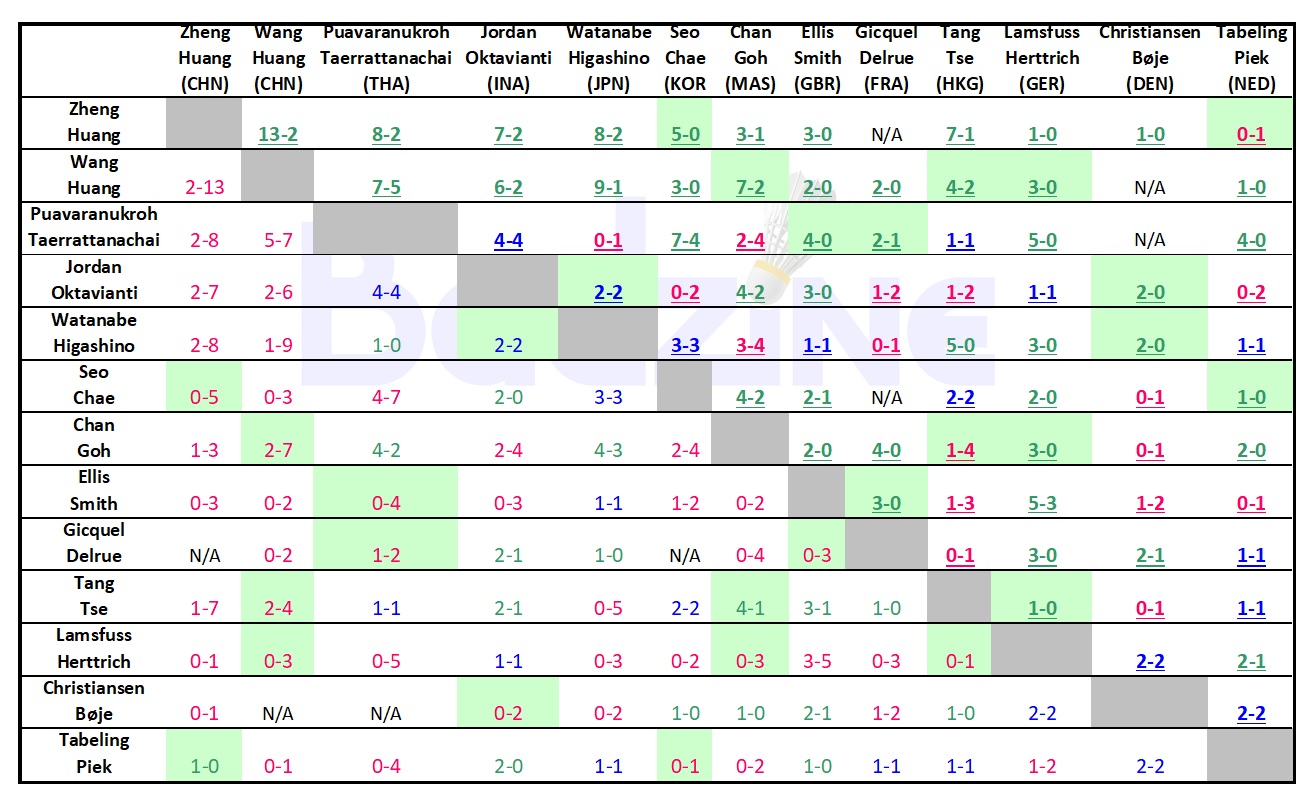
Click on the above table to see a version with links to detailed head-to-head results. Cels shaded in green denote match-ups that will take place in the round robin stage.

